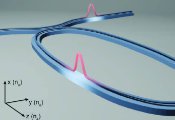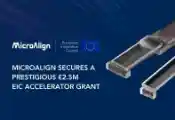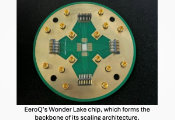New Funding for Projects to Boost Scotland’s Photonics Sector
December 10, 2024 -- A diverse selection of impact projects, which include devices for more accurate timing, ultra-secure encryption, and retinal monitoring, are set to benefit from the first round of funding support from the Photonics & Quantum Accelerator (PQA).
These projects will lead to company growth, more jobs in Scotland, and benefits to the country’s wellbeing.
The PQA unites researchers from the Universities of Glasgow, Strathclyde, Heriot-Watt and St Andrews with local authorities and industry bodies.
Together, they are working to advance the growth of the photonics sector in Scotland's Central Belt - a region that has been at the forefront of research and innovation in photonic technologies for more than half a century and has the potential to reach a turnover of £4bn in years to come.
Six projects will share in £237,000 in new impact acceleration funding from the PQA. A further £3.2m is available for future funding rounds, with the second call for applications open until 17th December 2024.
The majority of the projects utilise the quantum properties of light, a growth area in Scotland. At Heriot-Watt University, Dr Natalia Herrera Valencia will develop an easy-to-use quantum photonic system that will create cost-effective entanglement links over a telecoms network. This will enable ultra-secure encryption and interconnected quantum computers. British Telecom is trialling the system in a data centre environment.
The University of Strathclyde’s Martin Lee, Paulo Moriya, and Alan Kemp are partnering with Caledonian Photonics Ltd to develop a compact diode-pumped Titanium-Sapphire laser with a narrow spectral linewidth as a work-horse component for quantum technology, particularly for sensing and timing applications.
A second project at Heriot-Watt, led by Dr Ross Donaldson, will develop a 2D waveguide to prevent atmospheric turbulence from disrupting optical and quantum communications between satellites and the ground.
Two projects use light to benefit society. The University of St Andrews’ Dr Graham Bruce (School of Physics and Astronomy) and Erica Kotze and Dr Pilar Gil (Libraries and Museums) will work with a number of libraries and other collecting institutes across Scotland, including the National Library of Scotland and the Library of Innerpeffray, to develop a cost-effective hand-held scanner to detect poisonous arsenic used in the production of book covers in the 19th century.
At the University of Glasgow, Professor Andy Harvey will work with Dunfermline-based Optos to transfer a new retinal-monitoring technique for use within their scanning ophthalmoscopes, making their products more competitive.
A third project at Heriot-Watt University, led by Professor Brian Gerardot, will build a prototype autonomous semiconductor device assembly system utilising photonic technologies. The machine rapidly and reproducibly builds novel materials and devices with photonic, quantum, semiconductor, magnetic, or ferroelectric properties, enabling many new applications.
Today, Scotland is recognized globally for its strength in photonics, with the established research and innovation cluster contributing more than £1bn to the Scottish economy. The opportunities for photonics to produce economic and societal impact in central Scotland are increasing.
The PQA aims to harness academic excellence in photonics and quantum technologies to accelerate growth of the sector through a four-year plan developed with civic partners. This plan focuses on growing the photonics economy through entrepreneurship and company creation, expanding the base of skilled workers in photonics technologies, and increasing public awareness of photonics and Scotland's leading role in the industry.
Professor Andy Harvey, of the University of Glasgow’s School of Physics & Astronomy, is the PQA’s principal investigator. He said: “These are all wonderful opportunities to create lasting impact in Scotland. The PQA will boost growth in the photonics and quantum sector in Scotland to over £4bn by 2030 through supporting faster transfer of research to industry and increasing the numbers of skilled people in Scotland who can enable our existing companies to grow and new ones to form and thrive.
“These projects are fantastic examples of the variety of opportunities for photonics to underpin emerging industries such as quantum communications and computing, while also doing a public service by helping our literary heritage to be safely stored and accessed.”
The Photonics & Quantum Accelerator is a £4.7M Place Based Impact Acceleration Account funded by UKRI via the Engineering and Physical Sciences Research Council (EPSRC).




































